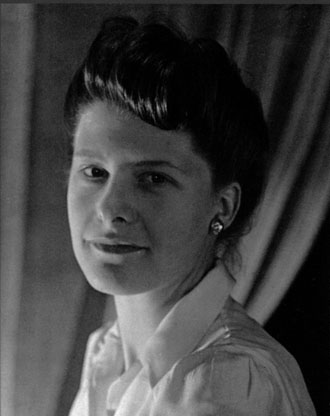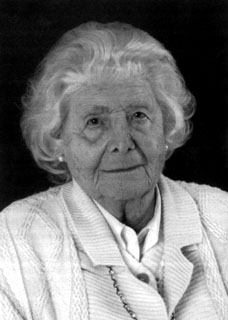Fourth Way Perspectives
Book Review: Discovering Gurdjieff
by Dorothy Phillpotts
Mr. Gurdjieff said, "Awakening begins when a person realizes that they are going nowhere and they do not know where to go." Dorothy Phillpotts, who later became a respected teacher of the Work in England, was such a person as an adolescent in the late 1920s. She was part of a "spirited" family whose members were given to frequent disputes in which she found herself unable to side with either the "yes" or "no" faction, preferring "not knowing." She experienced a feeling of incompleteness, a desire to know how to think. The adults in her life, especially her mother, tried to dissuade her from serious questions and thoughts.
The reader experiences Phillpotts' strong desire to know and we follow her forays into philosophy, experiments with the Methodist church and Theosophy, her confirmation in the Church of England when she was enveloped in a "fire from heaven"—a light surrounding her, which ebbed over time leaving her still hungry for connection and understanding. One of the questions that arose in her was what is sincerity, and could there be a way to it?
In 1941, in wartime London, Phillpotts married George, a student of J.G. Bennett. Her husband apparently never discussed the ideas with her previous to inviting her to attend Bennett's lectures on the relationship between religion and psychology, according to "The System as taught by P.D. Ouspensky." The origins of the "System" were murky; the name Gurdjieff was known by only a few, and Ouspensky told his students not to discuss Gurdjieff. It was not known, in fact, if he was still living.

Dorothy Phillpotts
Ouspensky left England for America in January 1941, convinced that Germany would win the war. He had laid down a rule that the teaching was not to be written about or commented upon. Bennett asked if he could write out the ideas in Ouspensky's absence and was told it was an impossible task. He was not, however, directly forbidden from doing so. Bennett then set out to present the teaching with an emphasis on practice rather than theory. His particular interest was the Law of Three, which he had traced to its roots in Indian sacred literature.
Bennett's keen mind and wide ranging erudition is evident in the lectures. Listening to the lectures, Phillpotts finds her "long unsatisfied mind slowly expanded." She avidly absorbs the ideas, which go beyond the philosophy of Jung, Freud and the others that she has read. Bennett tells the group that the one thing we all lack is self-knowledge, and that the key is to observe the centers without comment.
As a professional reporter, the author faithfully and exactly transmits what she heard in the lectures about the work of the centers, the higher centers and self-remembering. In the foreword to Discovering Gurdjieff Peter Brook says, "Phillpotts' book brings the objective and the subjective together." In these early chapters her writing is indeed objective if rather dry; there is no hint of the personal.
After a time, Bennett introduced "Practical Work in suitable conditions" in addition to the lectures; this consisted of tasks carried out at Coombe Springs, his large Edwardian mansion on several acres outside London. Bennett put together a privately published book called "Values" that was a compilation of ancient and modern religious texts on the doctrine of values. He wrote the preface to the book and it was Phillpotts' task to work on the editing and to find a printer for the book—a difficult undertaking in wartime when paper was rationed. The book consisted of 38 excerpts of works from Islam, the Desert Fathers, Plato and the Yoga Sutras, among others. Interestingly, the most numerous passages are from the Persian poet Rumi, the poet embraced by New Agers and thought to be popularly unknown before then. Reading Rumi changed Phillpotts' attitude toward Islam. She was also moved by Nachiketas' dialogue with Death in the Katha Upanishad. Her deep feelings seemed to come alive in working with these texts.
We are reminded that the wealth of Work books we have today did not exist at that time, and so Phillpotts delves into books on mysticism, Plotinus and William James for answers to her questions about higher consciousness and a change of being that she felt were unanswered in the lectures on Ouspensky's system.
After the end of the war Bennett's mode of teaching changed from strictly following Ouspensky's teaching to incorporating ideas of his own and attracting a wider group of students. His first lecture series focused on "The Crisis in Human Affairs," in which he introduced the concepts of the "psycho-static" which posited the view that the essential nature of man is unchangeable and the "psycho-kinetic" which held the possibility of movement or transformation within that essential nature.
In January 1947 Ouspensky returned to England and resumed meetings at Colet Gardens; however, he soon repudiated the system he had created from Gurdjieff's ideas. During this period he had no contact with Bennett or his pupils, although they would hear at second hand about the activities at Colet Gardens. Phillpotts wondered if what Ouspensky finally rejected was "the constant betrayal always implicit in his never-ending intellectualization." Ouspensky died that October a broken man.
Bennett left on a professional visit to America regarding coal research in 1948. He accepted Mme Ouspensky's invitation to visit her at Mendham while in the country. She had always taken Gurdjieff as her teacher and had not returned to England with her husband. She said to Bennett, "What would you do if a Higher Teacher came?" Then she revealed that contrary to widespread opinion Gurdjieff was alive and teaching in Paris and that he was quite sane, not mad as had been rumored. She advised Bennett to go to him at once.
Bennett's pupils gathered at Coombe Springs to hear this urgent news. Phillpotts was electrified by the possibility of actually being in the presence of Gurdjieff, and in the subsequent chapters the cool, objective reporter is no more. She was opened to a new perception: "A feeling that I had never before experienced coursed through me, seeming to flow upward and outward. . . . And the certainty of being made aware of truth, so simple but profound, surrounded me in waves. . . . It was right not to have accepted Man as a mere unit in an evolutionary chain—but the potential heir to the very stuff of consciousness released in the Universe at the dawn of creation."
Bennett met with Gurdjieff and returned to his students with an exercise to deepen their experience of self-remembering. He also brought readings from "Beelzebub's Tales"; these same readings were read every day in Gurdjieff's apartment. Bennett started to take two or three of his pupils with him to Paris. As the mother of a nursing infant travel seemed difficult for Phillpotts, but she and her husband did set out for Paris with baby Caroline.
We welcome any new description of Gurdjieff in those last days. Phillpotts' keen sensibility makes her experience come alive, and her meeting Gurdjieff for the first time is quite vivid. He entered the room and, "what I felt then was beyond evaluation; there was no inner comment at all. Nothing: neither approval nor disapproval. I just stood there, quite free, as if suspended in a state of steady perception." She goes on to write about the solemnity she felt at Gurdjieff's table, a kind of awe that took her back to the feelings of earliest childhood, but with a consciousness of the present moment. His presence brings her to the feeling center that was missed in the intellectual approach of the "System."
He says of Caroline, "That baby, she my pupil. She understand everything, all Beelzebub. You not understand, but she understand…. She my youngest pupil." Phillpotts ponders what she doesn't understand, but knows that work on herself will lead to a different kind of understanding. Bennett points out that her drive for consciousness was hampered by her psychological approach and he directed her to a more complete approach to the Work involving group work, the ideas and the Movements, and not trying to create her own tasks.
On another visit to Paris Gurdjieff is dismissive of Bennett, saying, "Not necessary now do Bennett stuff. . . . Necessary only come to me here." At one meeting he attacks Phillpotts, telling her she is a nonentity, but it's Bennett's fault. His "Bennetski" are "lunatic" but not "spoiled" as are the "Ouspenski." She sees that Bennett is no longer her teacher and she must seek direction only from Gurdjieff. He tells her her work is to be a mother, to sacrifice for her children. "Necessary learn sacrifice."
There were readings from Ouspensky's "Fragments of an Unknown Teaching." Speaking to Lord Pentland while holding the book, Gurdjieff said, "That fool Ouspensky, if he not leave me, he not had died. . . . He tell exact what I say."

Phillpotts' assessment of why Ouspensky left Gurdjieff is one of the most cogent that this reviewer has read: "He failed to see that Gurdjieff's explanation about ‘Man’ included Ouspensky himself. Ouspensky imagined that he was different from ordinary men, and that he understood on a different level . . . and that he could accept the teaching without accepting the teacher. . . . He presumed to have assimilated things that he had only just been introduced to."
During her visits to Paris Gurdjieff's deep fatigue is evident, but Phillpotts is unprepared for the news that he is too ill to see students; a week later she learns he has died. She and her husband fly to Paris and go to the chapel where Gurdjieff lies in state. She stays on for the Mass at the Russian Cathedral where she experiences "the gift of silence" and on to the cemetery at Avon for the burial. Later, Mme de Salzmann stresses the need for the group to hold together in the absence of their irreplaceable teacher.
Phillpotts says Gurdjieff had "pointed to an entirely new sense of self, soon, and the promise of a different kind of consciousness, later." She reminds us once again how rare a teacher Gurdjieff was and how fortunate we are to share in his teaching.
—Barbara Allen Patterson

